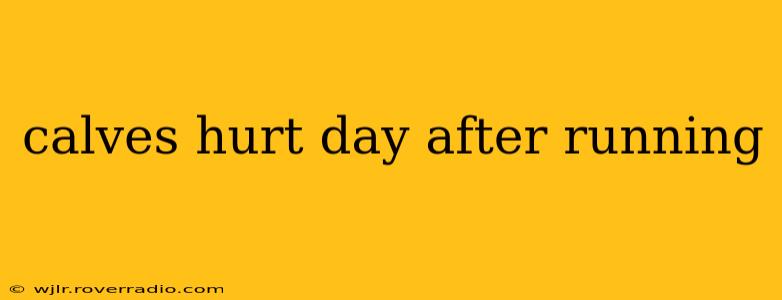Running is a fantastic way to improve cardiovascular health and overall fitness, but it can also take a toll on your body, especially your lower legs. Many runners experience calf pain the day after a run, a common ailment often caused by overuse, improper form, or underlying conditions. This comprehensive guide will delve into the causes of post-run calf pain, effective treatment options, and preventative measures to keep you running pain-free.
Why Do My Calves Hurt After Running?
Post-run calf pain is frequently linked to muscle strain, inflammation, or even more serious issues. Let's break down the common culprits:
-
Muscle Soreness (DOMS): Delayed Onset Muscle Soreness, or DOMS, is the most common cause. This is the familiar muscle ache that appears 12-24 hours after intense exercise. It's a result of microscopic muscle tears that occur during strenuous activity. These tears are a normal part of the muscle-building process, and the soreness is typically temporary.
-
Overuse: Running too much, too soon, or without adequate rest can significantly strain your calf muscles. This overuse can lead to inflammation and pain.
-
Improper Running Form: Incorrect running technique, such as overstriding or landing too hard on your heels, can put excessive stress on your calves and other lower leg muscles.
-
Dehydration: Dehydration can reduce muscle performance and increase the risk of injury. Proper hydration is crucial for optimal muscle function.
-
Inadequate Warm-up/Cool-down: Failing to adequately prepare your muscles for exercise or properly cool down afterward can increase the likelihood of calf pain.
-
Tight Calf Muscles: Pre-existing tightness in your calf muscles can make them more susceptible to injury during running.
-
Underlying Medical Conditions: In rare cases, calf pain can be a symptom of more serious conditions, such as plantar fasciitis, Achilles tendinitis, or even a stress fracture. Persistent or severe pain warrants a visit to a doctor or physical therapist.
What Can I Do If My Calves Hurt After Running?
Addressing calf pain effectively involves a multi-pronged approach:
-
REST: Give your calves a break. Avoid strenuous activities that aggravate the pain.
-
ICE: Apply ice packs to your calves for 15-20 minutes at a time, several times a day. This helps reduce inflammation.
-
COMPRESSION: Wearing compression sleeves can improve blood flow and reduce swelling.
-
ELEVATION: Elevate your legs when resting to promote better circulation and reduce swelling.
-
OVER-THE-COUNTER PAIN RELIEVERS: Ibuprofen or naproxen can help manage pain and inflammation. Always follow the recommended dosage.
-
STRETCHING: Gentle stretching of your calf muscles can help improve flexibility and reduce tightness. Focus on stretches like the gastrocnemius and soleus stretches.
How Can I Prevent Calf Pain After Running?
Prevention is key to avoiding post-run calf pain. Here's how:
-
Gradual Progression: Gradually increase your running mileage and intensity to avoid overloading your muscles.
-
Proper Running Form: Focus on maintaining proper running form, ensuring you land midfoot and avoid overstriding. Consider working with a running coach to analyze your form.
-
Adequate Warm-up and Cool-down: Always include a proper warm-up before each run and a cool-down afterward. Dynamic stretches like leg swings and high knees are ideal for warm-ups, while static stretches like calf stretches are best for cool-downs.
-
Hydration: Stay properly hydrated before, during, and after your runs.
-
Strengthening Exercises: Incorporate strength training exercises, such as calf raises, to build stronger calf muscles and improve stability.
-
Proper Footwear: Wear supportive running shoes that fit well and provide adequate cushioning.
Should I See a Doctor for Calf Pain After Running?
While most calf pain after running is temporary and resolves with rest and self-care, you should consult a doctor or physical therapist if:
- The pain is severe or persistent.
- The pain is accompanied by swelling, redness, or numbness.
- You have difficulty walking or bearing weight.
- The pain doesn't improve after a week of home treatment.
By understanding the causes of post-run calf pain, implementing effective treatment strategies, and incorporating preventative measures into your running routine, you can significantly reduce your risk of experiencing this common ailment and continue enjoying the benefits of running. Remember to listen to your body and prioritize rest and recovery.
